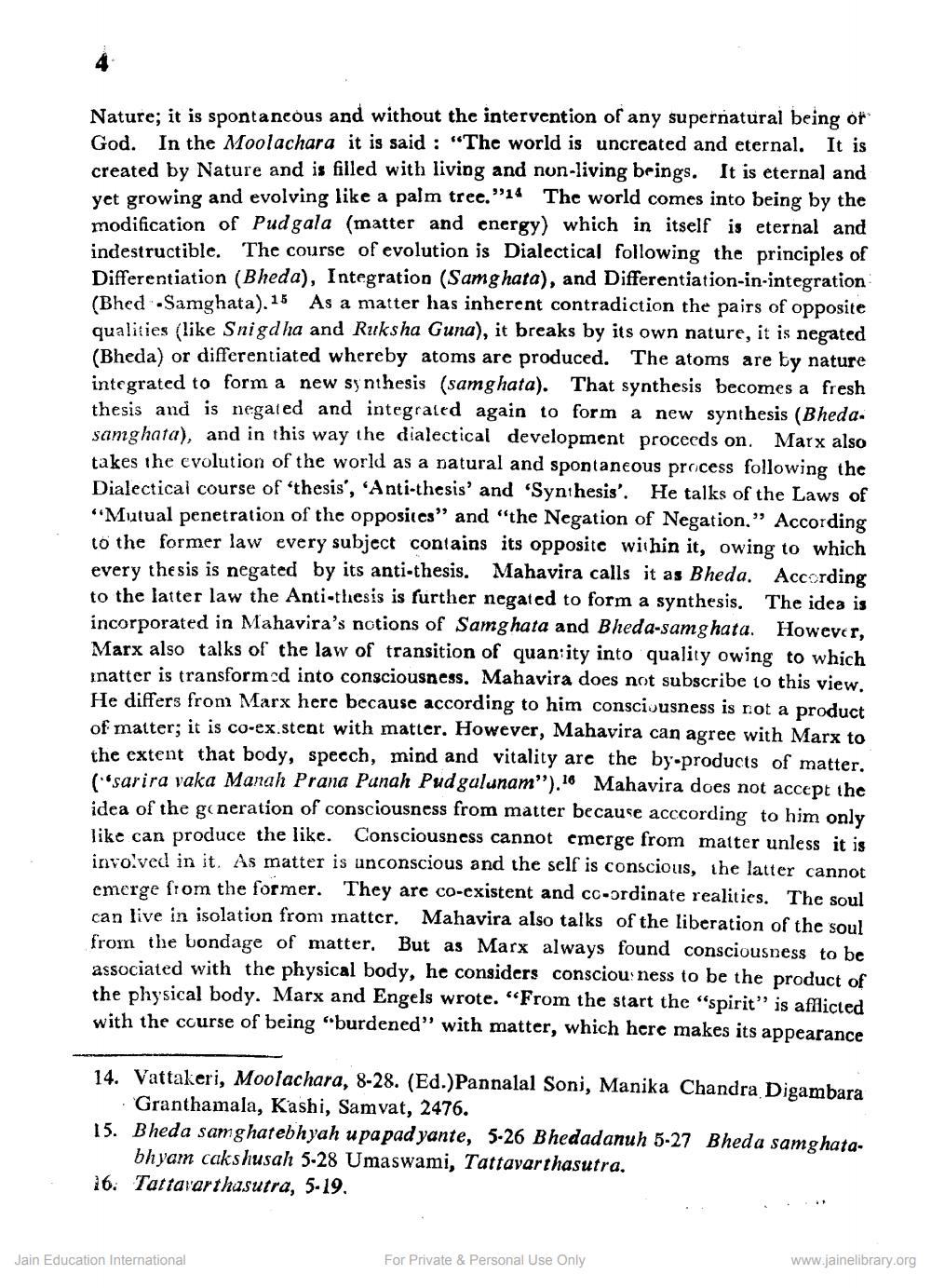________________
Nature; it is spontaneous and without the intervention of any supernatural being or God. In the Moolachara it is said : "The world is uncreated and eternal. It is created by Nature and is filled with living and non-living beings. It is eternal and vet growing and evolving like a palm tree."14 The world comes into being by the modification of Pudgala (matter and energy) which in itself is eternal and indestructible. The course of evolution is Dialectical following the principles of Differentiation (Bheda), Integration (Samghata), and Differentiation-in-integration (Bhed -Samghata). 15 As a matter has inherent contradiction the pairs of opposite qualities (like Snigdha and Ruksha Guna), it breaks by its own nature, it is negated (Bheda) or differentiated whereby atoms are produced. The atoms are by nature integrated to form a new synthesis (samghata). That synthesis becomes a fresh thesis and is negated and integrated again to form a new synthesis (Bheda. samghata), and in this way the dialectical development proceeds on. Marx also takes the evolution of the world as a natural and spontaneous process following the Dialectical course of 'thesis', 'Anti-thesis' and 'Synthesis'. He talks of the Laws of "Mutual penetration of the opposites" and "the Negation of Negation.” According to the former law every subject contains its opposite within it, owing to which every thesis is negated by its anti-thesis. Mahavira calls it as Bheda. According to the latter law the Anti-thesis is further negated to form a synthesis. The idea is incorporated in Mahavira's notions of Samghata and Bheda-samghata. However, Marx also talks of the law of transition of quan:ity into quality owing to which inatter is transformed into consciousness. Mahavira does not subscribe to this view. He differs from Marx here because according to him consciousness is not a product of matter; it is co-ex.stent with matter. However, Mahavira can agree with Marx to the extent that body, specch, mind and vitality are the by-products of matter. ( sarira vaka Manah Prana Panah Pud galunam"). Mahavira does not accept the idea of the generation of consciousness from matter because acccording to him only like can produce the like. Consciousness cannot emerge from matter unless it is involved in it. As matter is unconscious and the self is conscious, the latter cannot emerge from the former. They are co-existent and co-ordinate realities. The soul can live in isolation from matter. Mahavira also talks of the liberation of the soul from the bondage of matter. But as Marx always found consciousness to be associated with the physical body, he considers consciou ness to be the product of the physical body. Marx and Engels wrote. “From the start the "spirit" is afflicted with the course of being "burdened" with matter, which here makes its appearance
14. Vattakeri, Moolachara, 8-28. (Ed.)Pannalal Soni, Manika Chandra Digambara
Granthamala, Kashi, Samvat, 2476. 15. Bheda sam gharebhyah u papad yante, 5-26 Bhedadanuh 5-27 Bheda samghata
bhyam cakshusah 5.28 Umaswami, Tattavarthasutra. 16. Tattararthasutra, 5-19.
Jain Education International
For Private & Personal Use Only
www.jainelibrary.org




